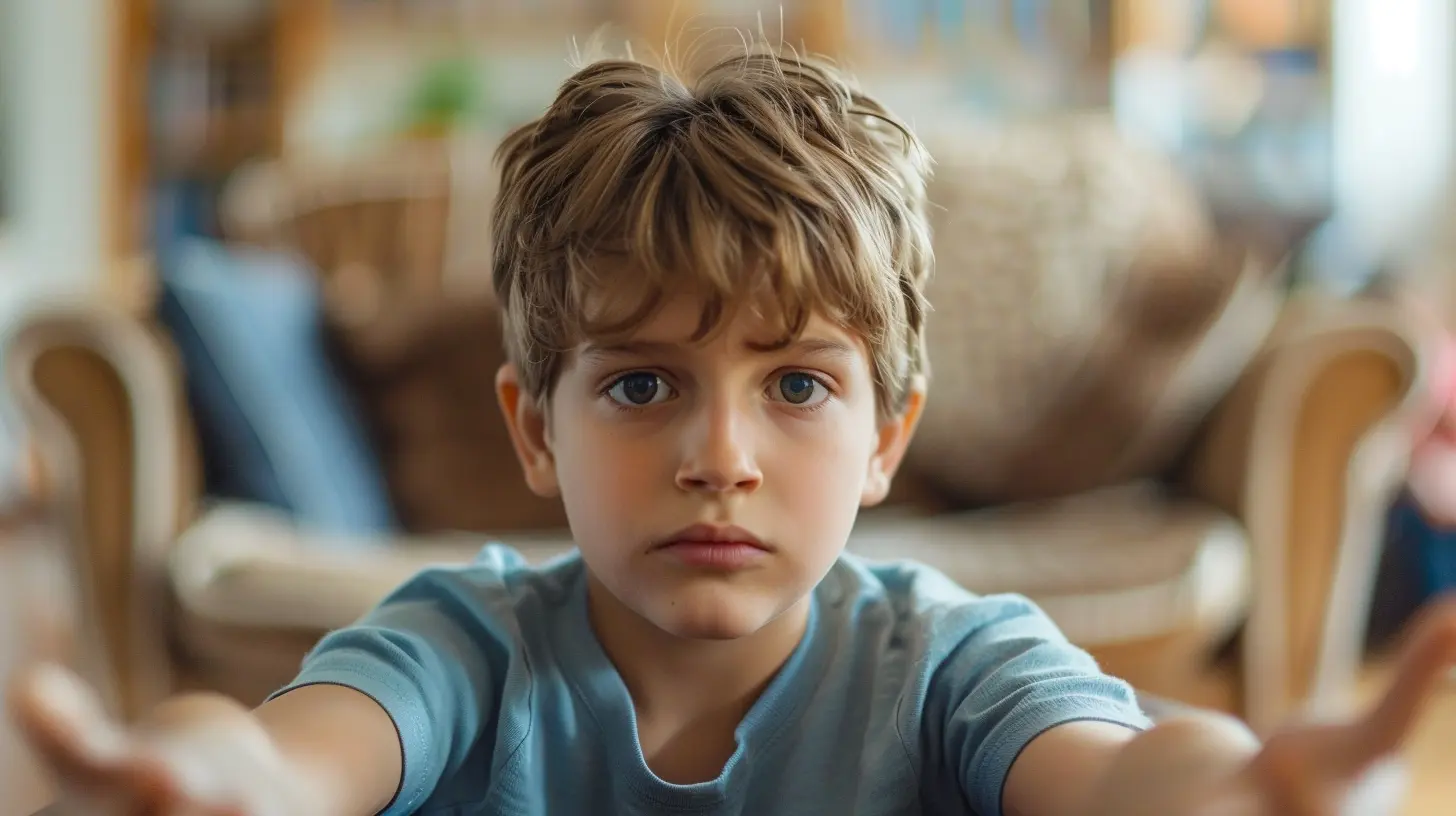Setting Boundaries With Love: A Guide to Consistent Discipline
14 August 2025
Parenting is a rollercoaster, isn’t it? One minute you're cuddling your sweet toddler who can't stop giving you hugs, and the next, you’re wondering how your little angel learned to negotiate snack time like a seasoned lawyer. It's no secret—raising kids is tough. But here's the good news: it doesn’t have to be a constant battle. One of the most powerful (and loving) tools you can use as a parent is setting boundaries.
Now, before your mind flashes to harsh rules and stern voices, let’s pause. We’re talking about setting boundaries with love. Yes, love. Boundaries are not about being strict for the sake of it. They're about building structure, security, and mutual respect. So, grab a cup of coffee, take a deep breath, and let’s chat about how to discipline with consistency and kindness.
Why Boundaries Matter (A Lot More Than You Might Think)
Imagine trying to drive in a city with no traffic lights, road signs, or lanes. Total chaos, right? That’s what life feels like for kids without boundaries. They don’t always say it (or show it), but children crave structure. It helps them feel safe, understand expectations, and learn self-control.Boundaries help children:
- Develop responsibility
- Understand consequences
- Build self-discipline
- Feel secure and loved
When they know what’s expected, they’re more likely to thrive emotionally and socially.
The Heart of Discipline: Love, Not Control
Let’s push aside the old myth that discipline is synonymous with punishment. Spoiler alert: it’s not. Discipline comes from the word “disciple,” which means to teach or guide.When we discipline with love, we’re not trying to control our kids—we’re guiding them. We’re helping them grow into kind, emotionally intelligent, and resilient adults. That’s the dream, right?
Instead of thinking "How do I stop this bad behavior?", try asking yourself, "What does my child need to learn?" That shift changes everything.
Start With Your Parenting Values
You can’t set consistent boundaries if you’re not clear on what matters most to you as a parent. Take a moment to reflect:- What kind of values do I want to instill in my child?
- Which behaviors are non-negotiable in our home?
- Where am I willing to be flexible?
This isn’t a one-size-fits-all deal. Your home, your values. But once you're solid on what's really important, setting clear and consistent boundaries becomes way easier.
Be Clear, Be Calm, Be Consistent
Okay, here’s the trifecta of successful boundary-setting:1. Clarity – Kids can’t follow rules they don’t understand.
2. Calmness – Yelling muddies the message.
3. Consistency – If the rules change every day, they stop making sense.
Let’s break these down.
1. Clarity: Say What You Mean
Be specific. “Behave yourself” is vague. “You need to ask before taking something that isn’t yours” is crystal clear. Clear communication removes confusion and helps kids understand exactly what’s expected.Also, be age-appropriate. A three-year-old won't grasp time-outs the same way an eight-year-old will.
2. Calmness: Model The Behavior You Want
Easier said than done, right? But here’s the thing—kids learn more from what we do than what we say. If we lose our cool every time they push a limit, we’re teaching them to do the same.Take a deep breath (or five), and respond instead of reacting. It sends a powerful message: “Even when things feel out of control, I’m still your calm and safe space.”
3. Consistency: Keep Those Boundaries Steady
Imagine playing a game where the rules change every five minutes. Frustrating, right? Kids feel the same way when boundaries are all over the place. Consistency builds trust and predictability.If bedtime is 8:00 PM on weekdays, try to stick to it—even when it’s tempting to cave. Show them that your words matter and your boundaries are real.
Natural Consequences: Let Life Be The Teacher
Sometimes, the best teacher is reality. When it’s safe to do so, let natural consequences play out.- Forgetting their homework? They may get a lower grade.
- Refusing to wear a coat? They’ll feel cold and probably remember next time.
This approach teaches responsibility without lectures or power struggles. Just be sure the consequence is safe and doesn’t lead to shame or harm.
Logical Consequences: Make It Make Sense
When natural consequences aren’t an option, go with logical ones. That means the consequence should connect directly to the behavior.- If your child draws on the wall, they help clean it up.
- If they break a toy by throwing it, that toy’s off-limits for a while.
Avoid unrelated punishments like, “You didn’t brush your teeth, so no screen time for a week.” That just feels unfair and confusing.
Say Goodbye to Guilt
Let’s face it—setting boundaries can feel uncomfortable. We want our kids to be happy, and it hurts to see them upset. Trust me, every parent has been there.But here’s the truth: a child who’s never told "no" might struggle to handle real-world disappointments. Boundaries teach resilience. They show your child that love isn’t always about giving them what they want, but giving them what they need.
So, guilt? You can let that go now.
Scripts That Actually Work
Need a hand in the heat-of-the-moment? Try these simple, loving phrases:- “I love you too much to let you act that way.”
- “I see you're upset. Let's find a better way to handle those big feelings.”
- “I'm here to help you, but it's still not okay to hit.”
- “You’re allowed to be mad. You're not allowed to break things.”
Sometimes, having a go-to script helps you stay grounded—and keeps the message clear.
Handling Pushback (Because It’s Going to Happen)
Will your kid test the boundaries? Um, yes. Repeatedly. But that doesn’t mean you’re doing it wrong. It means you’re doing it right.Kids push limits to understand where they are.
Here’s how to handle it:
- Stay calm and confident.
- Restate the boundary without arguing.
- Follow through with the consequence—every time.
Think of yourself as a lighthouse: steady, unwavering, and always shining through the storm.
Boundaries + Connection = Magic
Discipline isn’t the enemy of connection. In fact, strong boundaries actually deepen your bond with your child. When kids know where the line is—and that it won’t move—they feel safer. And when you set that line with love, patience, and understanding? That’s where the magic happens.So don’t fear the rules. Embrace them—as part of your love language.
Flexibility: The Secret Ingredient
Consistency is key, yes—but don’t forget to be human. Sometimes, plans change. Kids get tired. Parents get tired. Life happens.Being flexible doesn’t mean throwing boundaries out the window. It means you’re willing to adapt when it makes sense. If your usually polite kid has a meltdown at a party, maybe they’re overwhelmed—not rude. Respond with empathy, not just enforcement.
Discipline + empathy = powerful parenting.
How to Stay Sane Through It All
Let’s be real—this stuff isn’t always easy. You’ll have days where you feel like the worst parent in the world. (You’re not.) Here are a few sanity-saving reminders:- Take breaks when you need them.
- Talk to other parents.
- Apologize when you mess up (that’s powerful modeling).
- Celebrate the small wins.
And above all, stay rooted in love. That’s your parenting superpower.
In a Nutshell
Setting boundaries with love isn’t about being the “mean parent.” It’s about being the guide your child truly needs. One who’s consistent, calm, and clear. One who teaches through connection, not control.Sure, there will be tears (probably yours and theirs). But over time, you’ll see the difference. Your child will learn respect, self-discipline, and resilience—not from fear, but from the foundation of your unwavering, loving presence.
So go ahead, draw those lines in the sand—with a whole lot of love.
all images in this post were generated using AI tools
Category:
Discipline TechniquesAuthor:

Maya Underwood
Discussion
rate this article
1 comments
Rosanna McConkey
Boundaries nurture trust, guiding children while fostering independence and emotional resilience.
August 26, 2025 at 2:56 AM

Maya Underwood
Thank you! I completely agree—setting boundaries lays the foundation for trust and helps children develop essential life skills.


